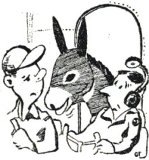
Vol. 1, No. 19 Published by India China Division, Air Transport Command May 24, 1945

 When ICD helped fly Chinese troops from Burma to China, pack mules, horses and equipment went with them.
When ICD helped fly Chinese troops from Burma to China, pack mules, horses and equipment went with them.
|
TRANSPORTING HORSES, JEEPS,
GUNS, MEN TO COMBAT ZONE
ATC Crews Work in Conjunction with 10th Air Force;
Fly Hundreds of Sorties in Front Lines in Unarmed Ships
The vital part played by ICD in stopping the Japanese threat against Kunming in the closing days of 1944 - when the Jap bombers came over on Christmas Eve, and Tokyo Rose told the boys to pack up and get out - now can be told.
ICD, with Tenth Air Force Troop Carrier and Combat Cargo squadrons, and Air Commando transports on short notice airlifted major elements of the famed Chinese Sixth Army, involving thousands of troops, and horses, mules, jeeps, guns, ammunition and other tactical supplies, from the vicinity of Myitkyina, where the divisions had assembled, to the Kunming area.
Flew Successive Flights
Under the operating control of Maj. Gen. Howard C. Davidson's Tenth Air Force, ICD pilots, crew members and ground men flew hundreds of sorties with transport aircraft packed to capacity with men, vehicles, animals and weapons. They flew day and night, fair weather and foul, and never lost a plane.
Of the three organizations assigned to the movement, ICD flew approximately two-thirds of the sorties. ICD crews briefed on the high strategic importance of the project flew successive flights in a single 24-hour period with only brief stops to eat at the Chinaside terminals where their cargoes were unloaded.
Japs Driving In
"Because of security, it is often impossible to reveal the part ICD pilots play in military operations," Lt. Col. Hamilton Heard, ICD director of operations, said in releasing information on the Sixth Army movement after the China and India-Burma Theaters had lifted censorship. He added:
"This instance is simply more evidence of the close tactical support our pilots are giving to the Allied forces in China. Each pilot and crew member and ground man who participated in it is to be commended for his work."
At the time of the emergency lift, Jap troops were driving in strength west from Liuchow, seriously threatening Kunming and Chungking, as well as the eastern air terminals of routes between India and China, over which all war materials reaching China at that time were being flown.
To cope with this situation, it was determined to transport to China the Fourteenth and Twenty-Second divisions of the Chinese Sixth Army, with their weapons, pack animals and equipment from the North Burma fronts where they had been driving the Japanese southward from Myitkyina.
4 to a Plane
In one of the largest air movements of ICD, more than 25,000 soldiers, more than 1,500 pack animals, and scores of jeeps, howitzers and mortars were transported across the Hump. At certain terminals, as many as 50 ICD, Tenth Air Force and Air Commando transports were lined up at one time discharging their cargoes to stop the Japs.
The transport of the 1,500 pack animals was the first such large-scale transport by air. The animals, four to a transport, were braced in special plywood stalls and attended by four Chinese soldiers during the flight.
Some of the animals were captured Jap mules.
|
Wild Animals Among Those Hauled by Air
Not all the pack animals behaved on the flights over the Hump. On one occasion, a mule went berserk, kicked a hole in the fuselage, and finally was subdued by being knocked out. After that, crew members carried sidearms for such an emergency. On another occasion, a mule broke through the barrier erected across its chest, lunged forward and wound up with its head jammed into the radio operator's compartment back of the pilot . . . where the animal stuck. The mule was removed after the airplane landed.
Ground Men's Rotation Policy Changed by WD
Personnel Reported as Eligible in June, July, August to be Returned
Hq., Calcutta - Rotation of ground personnel - after an overall suspension since May 12 - is to be resumed, ATC headquarters in Washington advises.
All men who have already been reported to Washington as scheduled for rotation during June, July and August will be returned, the ICD personnel section announced. Rotation of air crews has not been affected by the current suspension throughout the Army.
No officers who departed the U.S. after June 30, 1943, and no enlisted men who left after July 25, 1943, are included in the report of personnel selected and scheduled for rotation.
A-1 announced that owing to the demand for men throughout ATC and the transportation difficulties encountered because of the overall readjustment program, replacements for the June, July and August quotas probably will not arrive before late July or August, if that soon. Therefore, it is unlikely that more than a few ground personnel will be rotated from this division before August.
Announcement will be made later of the date the suspension of rotation is lifted completely and of the plan for returning personnel not already selected and scheduled for rotation.
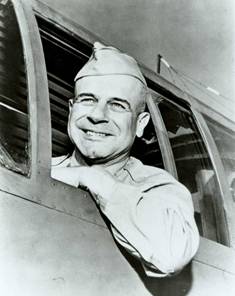
|
Doolittle, Tokyo Raid Vet, Drops In for Visit at ICD
Hq., Calcutta - The visit of one of the Air Forces' most distinguished leaders last week brought to the memory of many of the division's veterans one of the historic highlights of transportation of war materials to China over the Hump.
The visitor was Lt. Gen. James H. "Jimmy" Doolittle, hero of the famous B-25 strike upon Tokyo from the aircraft carrier Hornet in April 1942.
Briefed for Flight
The incident his visit brought to mind was the first flight of an Air Force aircraft over the Hump on April 8, 1942, by Brig. Gen. (then Col.) William D. Old, who carried high octane gasoline for Gen. Doolittle's bombers scheduled to refuel in China after the Tokyo raid. The flight was the beginning of organized transport of war materials to China which has culminated in ICD's transportation system of today.
While at headquarters, Gen. Doolittle conferred with Brig. Gen. Tunner, ICD commander. The crew of the former's special four-engine aircraft was briefed for continuation of the journey. In departing, Gen. Doolittle expressed his appreciation for courtesies extended during his visit.
Wears Congressional Medal
One of the top Air Force generals, Gen. Doolittle - once America's foremost speed pilot - made military aviator history when as a lieutenant colonel, he led the daring flight of heavily loaded B-25's off the flight deck of the Hornet, 800 miles from the Japanese homeland and dropped the first bombs on Tokyo, Nagoya and Kobe.
Since that time, the general has been in command of the 12th Air Force, Italy; the NW Strategic African Air Force; 15th Air Force, Germany and Austria, and the Eighth Air Force, England. One of the few Air Force generals to hold the Congressional Medal of Honor, he also holds the Distinguished Service Medal, Silver Star, DFC with one cluster, and the Air Medal with three clusters.
Highest 'Point' Men Are Up for Release
Hq., Calcutta - Announcement was made late Wednesday of the first five men to be released from ICD under the WD readjustment "point system." They are Sgt. Billie B. Sutton, of 1343 BU, 164 points; T/Sgt. Kenneth J. Brown, of 1342, 153; T/Sgt. Joel L. Sanders, of 1330, 151; T/Sgt. James W. Edwards, of 1330, 150, and Pfc. Michael Zayac, of 1305, 139. The first four are radio operators and Zayac is a mechanic.
Gen. George Congratulates ATC On Its 4th Anniversary
May 29 will mark the fourth anniversary of ATC.
In a statement to its 200,000 officers, enlisted men and civilian employees, Lt. Gen. Harold L. George, commander, congratulated them on their "considerable part in America's great and victorious war effort . . . (and) in the future development of constructive peacetime aviation, particularly in the important field of transport." He asserted:
"Tested through four years of continuous emergency operation, the ATC now confidently faces the supreme effort toward complete victory over our enemies. We must help move a vast war machine half-way around the world in order to concentrate crushing power against Japan."
Gen. George pointed out that >most of you have been too busy, under the pressure of stacking record on record . . . to realize fully the accumulated weight that air transport has thrown against our nation's enemies."
He also commented that the fourth anniversary was a fitting time to take notice of the more outstanding achievements and mentioned the following deeds as example of ATC's great part in the war:
By Jan. 1, 1945, 40,000 combat planes were delivered overseas, with 99.7 percent arriving safely. High priority cargo flown to combat zones has been credited with winning more than one important battle, and these air supply lines logged 858,407,753 ton miles in 1944.
Command personnel have amassed an impressive array of citations and other military honors and many have given their lives, though ATC is a non-combat organization.
ATC service totaled 2,434,854,439 passenger miles last year and made possible the contacts between high military and civilian officials that facilitated strategic and diplomatic decisions. Long hours, with little glory, in jungle, desert and arctic outposts have been endured by thousands.
To accomplish these tasks, the combined efforts of personnel lift ATC planes over more than 2,000,000 miles every 24 hours, equal to 80 times daily around the world at the equator.
Gen. George assured the personnel that they "may enjoy the gratification of a difficult and indispensable job well done," as well as the unquestioned right to all the rewards which ultimate victory will bring.
What, No Foot Warmers?
1311 BU, Gaya, India - Requisitioned in September for the cool Indian winter, 575 comforters arrived here this week in 110 degree heat. M/Sgt. Ernest S. Bingham, chief supply wallah, wasn't surprised. He's an old Army man.
An Ironic Situation is Created at 1337 by War Department
1337 BU, Sookerating, Assam, India - Pity poor Pfc. Leslie J. Kennedy, who has become the brunt of all moth-eaten brother-in-law jokes! He is stationed here where his brother-in-law, Lt. Col. George S. Cassady, is the base CO.
This ironic situation in which the higher-ranking wallah and one of the lowest-ranking married sisters, leaves Pfc. Kennedy in a dither. If he gets a promotion, he reasons, the boys in the backroom will nod their noggins knowingly and make salty remarks. If he doesn't get a promotion, they'll kid him unmercifully about that.
But one trump card he does have up his sleeve. He's the only man on the field who can call the colonel "George" and get away with it.
First Shipment of Soldiers, 42, Leaves for U.S.
To 'Take It Easy' A While so Typical Attitude of Most Men
A score of old soldiers, in the literal sense, have left ICD for home and discharge from the Army.
To a man, the group interviewed indicated "It'll sure be swell to get back to civilian life," and the GIs were almost unanimous in their intention to "just take it easy" for a while after their discharge.
Word has just been received that 40 now is the Army discharge age.
Among those from Hq released under a recent WD directive which guarantees a discharge to anyone over 42, upon application, was Cpl. Harry Dailes, 42, New York City, formerly in charge of color reproduction on the east coast for the A. B. Dick company. He plans to open a small business for himself - perhaps a cigar stand - instead of returning to his old position. He has a daughter, Lida, 18, a pre-med student at NYU. Dailes has been a multilith operator with the graphic information section.
Nine at 1305
Another from Hq was S/Sgt. Max Pearlman, 42, Los Angeles, who wanted to see his daughter graduate from
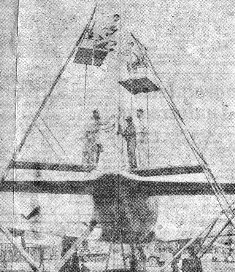 1346 BU, Tezgaon, India - This thing which looks like a stage creation is an efficient empennage stand. Equipped with
wheels, it can be pushed from one plane to another. It is a variation of a similar B-29 stand.
1346 BU, Tezgaon, India - This thing which looks like a stage creation is an efficient empennage stand. Equipped with
wheels, it can be pushed from one plane to another. It is a variation of a similar B-29 stand.
|
Nine of the first "over 42" group were from 1305. One was S/Sgt. Charles J. Eignor, 43, Brooklyn, who plans to go back to a private law practice when he sheds khaki. He said he'll "be glad to get home and back into civilian life again."
Pfc. Louis Runger, 43, New York City, formerly a job printer in a print shop at the Hotel New Yorker, will go into partnership in a job shop in Clifton, N.J.
Had 89 Points
Another from 1305 is Pfc. Francis H. Doughty, 44, of Philadelphia, where he was a waiter in one of the better hotels. He hasn't any definite plans for the future but was "mighty glad to be going home." S/Sgt. Peter A. Zaharias, 42, Essex, Md., a chief cook for the prewar seven years at the Wardpark Hotel, Washington, D.C., intends to own his own restaurant when he gets home. He is "glad to be leaving India."
"Uncle Sugar is going to look mighty good to me," said Pvt. George P. Dewey, 43, of Greenwich, Conn., who came overseas June 16, 1943. He served with a transport group at 1337; as assistant crew chief for Brig. Gen. Hoag, then commander of the India China wing at New Delhi, and for the past 13 months as a mechanic at 1305. Before the war he and his brother operated a garage in Greenwich. He wants at least three months of outside work "behind him" before he thinks of working on an indoor job. He is considering taking over the job of his father who has been in charge of an estate for 45 years. Dewey had 89 WD readjustment points.
'Mighty Glad'
The orders of Pfc. Harold A. Johnston, 43, of Whitinsville, Mass., were "what I've been waiting for." He was employed prewar as a truck driver for the Northbridge, Mass., city highway department. He's not sure he'll go back to that job. S/Sgt. William Paulchek, 42, of Uniontown, Pa., plans to return to his job as a crater for the Richmond Radiator and Enamel Company. Sgt. Joseph G. Busuttil, 45, pf Tuckahoe, N.Y., will return to his interior carpentry work - and civilian life which is "just the kind I like." Cpl. George A. Caldera, 44, of Hayward, Calif., was a mail clerk before the Army claimed his services. His old job is waiting him and he's "mighty glad to be going back to it."
Others on the initial shipment returning under the "over 42" directive are T/Sgt. John Andrews, 43, of Hartford, Conn., and S/Sgt. Everett R. Amos, 43, of Mishawaka, Ind., of 1300 BU; S/Sgt. Samuel Davidson, Plainfield, N.J., Pfc. Michael Gowatz, Olyphant, Pa., and Sgt. Norman E. Black, Alexandria, Pa., all of 1347 BU; and Pfc. George E. Huckstep, 44, of Gadsden, Ala.; S/Sgt. Robert E. Kenny, 44, of New York City; S/Sgt. Maurice M. Boyden, 42, of Burlington, Vt., and Sgt. Albert H. Bussee, 45, of Detroit of 1337.
Employ Cut-Away Engines to Instruct Civilians, Pilots
Hq., Calcutta - Cut-away engines that show the complete mechanical operations are being made from junked power plants at a local air depot.
Probably the first all-steel working models ever used in this theater, and the first in ICD, these engines will be utilized for classroom instruction to train mechanics and pilots in the workings of the units.
Under the direction of Lt. Kenneth Teeter, aircraft maintenance and engineering officer, six of these mock-ups are being made which will be distributed among the bases. Although there are several wooden models in existence, these engines, salvaged from the junk yards of the depot, will enable instructors to make the operations more real to their students.
It will be especially useful in training civilian mechanics, as well as the men who fly the planes. One of the most important uses of the models will be to familiarize pilots and crew chiefs with the necessary details in 100-hour inspections.
Five division mechanics from various bases are working on the project, and are being assisted by five civilian employees.
Discussion Groups Clarify GI's Postwar Problems
1337 BU, Sookerating, Assam, India - Under the leadership of T/Sgt. William A. Anderson, Squadron E of this base has formed a discussion group to thrash out and clarify problems which soldiers will be forced to face when they return to civilian life.
Once every week, in a hectic two-hour bull session, this forum discusses all phases of the "GI Bill of Rights" and the various opportunities it offers. Many questions are raised which clarify points of the bill which were previously misunderstood because of technical phrases.
One of the most interesting facts brought out by the discussions was the ignorance of soldiers about government business loans. Before the talks many men were unaware of the responsibilities which were a part of the monetary aids.
A foremost aim among the group's leaders is the attempt to persuade GIs to take advantage of the tear of education in agriculture, trade, mechanics or any other skill that will enable them to become economically independent.
The leaders and advisors of this post-war forum are Pfc. Hayzel B. Daniels, U. of Arizona; Cpl. John Crowe, Xavier U.; S/Sgt. John Goins, Lincoln U.; Cpl. Richard Jefferson, Harvard U.; Pfc. Leonard Beavers, U. of Calif.; Cpl. Durrad Smith, Kentucky State U.; Pvt. Fred C. Davis, Langston U.; Pfc. Herbert Adrian, Wilberforce U.; Pvt. Lincoln Gordon, U. of Detroit, and T/Sgt. Anderson, originator and permanent chairman.
Chinese Mechanics Were Employed by Eurasia Air Line, Now in China Wing
99 Specialists Worked With CATC for Many Years Before War
1340 BU, Kunming, China - Nearly 100 skilled Chinese aircraft mechanics, veterans of many years with a once-thriving commercial airline are now filling the shoes of GIs here where maintenance men are at a premium.
The mechanics are taking on-the-job training for the newer type of aircraft of ICD. Because of their previous experience, their work is of a highly commendable nature, according to Maj. Robert J. Hoss, director of aircraft maintenance.
99 Men At Work
ICD fell heir to the mechanics when the commercial line, known as the China Air Transport Company, dwindled to a point where the ground men found themselves with little more than time on their hands.
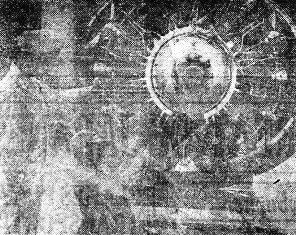 He are two of the 99 men that ICD fell heir to when a Chinese commercial airline dwindled to three planes. The men,
who now work in many of the sections of 1340's engineering department, have had up to 18 years' experience as mechanics.
Left is Capt. J. K. Louie, of the Chinese Army, who supervises the mechanics.
He are two of the 99 men that ICD fell heir to when a Chinese commercial airline dwindled to three planes. The men,
who now work in many of the sections of 1340's engineering department, have had up to 18 years' experience as mechanics.
Left is Capt. J. K. Louie, of the Chinese Army, who supervises the mechanics.
|
Service of supply, seeing the idle men at the Kunming airfield from which the line operates, approached officials in an attempt to acquire the extra men for ICD. Since the Chinese government wouldn't give up the airline, an agreement was reached whereby ICD would inherit all its surplus mechanics.
Now 99 men are working in various departments of the engineering section here.
Germans Left
Many of the mechanics had bee with the CATC for as long as 18 years. Once the largest in China the airline was formerly jointly operated by Chinese and German interests. At that time it was known as Eurasia and afforded air travel from Shanghai, Hong Kong, and other coastal cities.
As the Japs pushed into China the company moved westward. When the European war started the German pilots returned to Germany until finally the company was completely Chinese-controlled and became known as CATC.
As its routes shrunk the number of planes gradually decreased. With no replacements possible, the line now operates three Lockheed-Hudson type planes. Its main route is from Kunming to Chengtu, and the line itself is partially subsidized.
Since many GIs are due to return to the U.S., it is expected that the number of Chinese mechanics will be increased. Those now working here are directly under J. K. Louie, a captain in the Chinese Army, who was formerly with the CATC.
Sack Lovin' Jack Makes Fast Trip, Gets Back to Bed
1306 BU, Karachi, India - Sgt. John MacFarland, airplane mechanic, was pounding his ear in his snug little sack the other night when word came that a KAB C-46 was grounded with landing gear trouble at a field. End of ear pounding, exit John.
Hydraulic Specialist MacFarland was put on the first plane headed that way to straighten out the Commando's system.
He located the trouble almost immediately, changed a sticking valve, checked her out, and packed his tools, ready to return to Karachi and his sack. Then he was told the liner on which he had arrived had developed engine trouble.
He unpacked his tools, learned the symptoms from the pilot, took over the controls, and in 30 minutes had both engines humming nicely.
Then he grabbed a sandwich and hopped the next plane back to Karachi. Soon he was again pounding his ear in his snug little sack.
I & E Starts Course Featuring Models for Home Builders
1311 BU, Gaya, India - A course for future home builders and homeowners, developed by the Information & Education Office and approved by USAFI, soon will be open to all GIs here.
In 24 class periods, the course will cover such subjects as how to obtain loans for purchase of homes under the "GI Bill of Rights," things to look for in the selection of a building site, size and number of rooms to meet family needs and interests.
The schooling will be presented as part of the information and education program under the direction of 1st Lt. Robert S. Kelley. Pfc. Irving H. Asen, who planned the course, will be the instructor.
Thousand Laborers Resurface Runway While Planes Land
1337 BU, Sookerating, Assam, India - Two-thirds of the runway at this base was resurfaced in two and a half hours, while planes continued to use the strip throughout the entire period.
One thousand Indian laborers and six diesel rollers were employed to accomplish this speedy job.
To prepare the runway for the coming monsoon season, the CO, Lt. Col. George S. Cassady decided to resurface the runway and thus prevent any possible deterioration or decay because of the rains. For a week prior to the assigned day for the repairs, workers crushed rocks and piled them along the strip.
Trailer pressure tanks spread bitumen over the concrete surface, after which 1,000 workers scattered crushed rocks over the tar, followed by the diesel rollers which pressed the rocks into the new covering. More than 1,200,000 pounds of rock were spread during the short period.
The same method will be used to resurface the center portion on the runway. This should require a little more than one hour, during which time the strip will probably have to be closed.
Drivers' Union May Mean Great Things for Pilots
Trucking Union Would Have Comforts, Chicks & Cremo Cigars
1333 BU, Chabua, Assam, India - For ten rupees, pilots at this base may join the Flying Truck Drivers Union which is associated with the Assam Trucking Company and become entitled to all the benefits thereof.
Membership of the organization, known as the "Truck-off" club (combination of the words truck-driving and officers) is increasing rapidly.
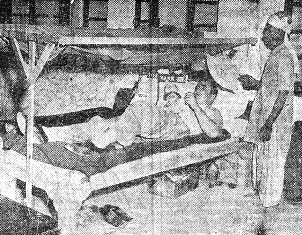 1306 BU, Karachi - For two years of Army life, Cpl. James T. Powers, Detroit, Mich., has spent his sack time worrying
about whether he was on or off the pint-sized cots he was issued. Finally, his buddies egged a squadron carpenter
into making a bed that would accommodate "Tiny's" 300 pounds of meat and muscle. Now with a bearer fanning him, and
an issue of Yank to browse through, Tiny admits he never had it so good.
1306 BU, Karachi - For two years of Army life, Cpl. James T. Powers, Detroit, Mich., has spent his sack time worrying
about whether he was on or off the pint-sized cots he was issued. Finally, his buddies egged a squadron carpenter
into making a bed that would accommodate "Tiny's" 300 pounds of meat and muscle. Now with a bearer fanning him, and
an issue of Yank to browse through, Tiny admits he never had it so good.
|
Travel in Comfort
According to the buildup and the personalized campaign letters which are being distributed, some of the good points of the new plan are:
The Dumbo (C-46) "drivers" would be awakened by the chaplain, instead of the CQ; the chaplain would drive the pilots to the flight line in a staff car equipped with berths for those who want a little more sleep; steaks and chicken would be served at breakfast - to the strains of a dance orchestra; weather service would be given to the "drivers" by men bringing the latest reports, which wouldn't have to be accepted. In fact, say the proponents, the pilots won't have to go if they don't want to!
When the pilot is all set to go, engineering would give him a list of "five ships in perfect condition and he may take his choice." If the pilot should decide to make the mission, the propagandists say, the ship will be parked in front of the operations building and the crew may relax while an engineering officer runs up the engines. A drop of one-sixteenth of an inch in the manifold pressure would disqualify the plane.
Nothing's Too Good
A band will play the "Hair Corpse" song as the plane taxies out to take off, and as the wheels come up the tune will be" You Got It" - for the benefit of the co-pilot. In the air a super navigator will appear for instructions and a coolie will take a stance behind the pilot's seat to fan him until the plane reaches cooler altitudes.
Nothing's too good for the pilots that fly the Hump, and "that's why," according to the union committee, "they've been getting nothing in the past." Now, however, things are going to be different - if the plans work out. On all flights, a stewardess will be standard equipment and will be required to wear shorts ay all altitudes below 21,500 feet. The co-pilot will remain awake during the entire flight and will not bother the stewardess. Hot coffee and short orders will be taken enroute.
You Sew 'em On, You Tear 'em Off, So Say Circulars
Hq., Calcutta - Men who return to the States after serving with outfits overseas now may wear their overseas unit shoulder insignia while on Stateside duty.
Before they are permanently assigned to another unit, they may wear the foreign service insignia on the left shoulder, and after being permanently assigned to a unit, they may wear the old insignia on the right sleeve.
In response to many inquiries from men in ICD the following excerpt from WD Circular III, dated April 7, is quoted: "Personnel returned from overseas for assignment in the United States are authorized to wear the shoulder sleeve insignia of the unit to which they were assigned overseas until they are permanently assigned to another unit - at which time the shoulder sleeve insignia of the new unit will be worn on the left shoulder sleeve . . . The shoulder sleeve insignia of the overseas unit may be worn (but is not required) in the same relative position on the right shoulder sleeve."
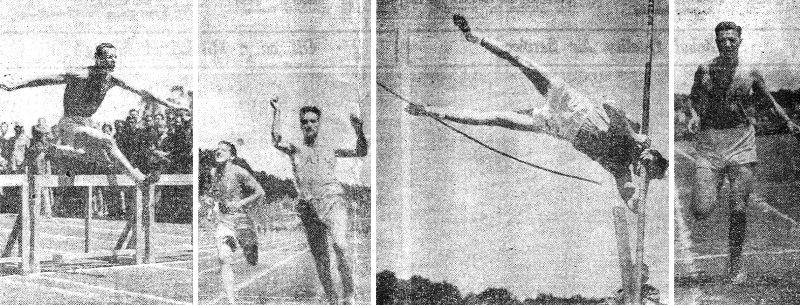 1340 BU, Kunming - (1) Sgt. James W. Jackson, Petersburg, Ind., clears the last hurdle
just before winning the 220 low hurdle competition for the ICD at the track meet held at Yunnan Provincial stadium.
(2) In a photo finish Pvt. Arvel W. Goodman, Cincinnati, squeezes out his ICD teammate Pfc. Lewis Bass, to win the
100 yard dash in 10.6 seconds. Goodwin is a former University of Kentucky track star. (3) Sgt. James Jackson sails
over the cross bar to rack up more points for the winning ICD track team. Placing second in the pole vault, Sgt. Jackson
cleared 10 feet, 6 inches. (4) Capt. Edward Kollar, Passaic, N.J., wins the mile run for ICD in 4:54.3. Capt.
Kollar holds a Stateside 440 record. The ICD ran away with the meet, eclipsing competition.
1340 BU, Kunming - (1) Sgt. James W. Jackson, Petersburg, Ind., clears the last hurdle
just before winning the 220 low hurdle competition for the ICD at the track meet held at Yunnan Provincial stadium.
(2) In a photo finish Pvt. Arvel W. Goodman, Cincinnati, squeezes out his ICD teammate Pfc. Lewis Bass, to win the
100 yard dash in 10.6 seconds. Goodwin is a former University of Kentucky track star. (3) Sgt. James Jackson sails
over the cross bar to rack up more points for the winning ICD track team. Placing second in the pole vault, Sgt. Jackson
cleared 10 feet, 6 inches. (4) Capt. Edward Kollar, Passaic, N.J., wins the mile run for ICD in 4:54.3. Capt.
Kollar holds a Stateside 440 record. The ICD ran away with the meet, eclipsing competition.
Ding-Boo-How, Anyhow, China Has Queer Rites
Curious Social Customs Seem Odd to American GIs Based There
1340 BU, Kunming, China - ICD men stationed in China have been getting an orientation lately in the ways of the Chinese.
While browsing around Kunming the other day, Pvt. Robert Muench, motor pool dispatcher, was amazed when he found that kerchiefs are given to guests at Chinese funerals in which they are to weep. He also learned that, centuries ago, the Japs believed bees were their common ancestors. "Are they," he queries, "sons-of-bees?"
'Top Good'
Every American soldier leaves China with at least two Chinese phrases - "Ding-how," literally meaning "everything is hunky-dory," and "Boo-how," which means, in effect, "no good."
The official dope on these phrases from a Chinese scholar is:
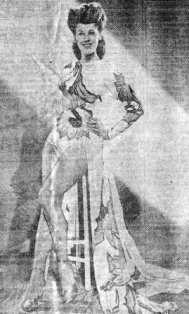 When ICD helped fly Chinese troops from Burma to China, pack mules, horses and equipment went with them.
When ICD helped fly Chinese troops from Burma to China, pack mules, horses and equipment went with them.
|
The written Chinese symbol for "Ting hao" is a woman with a child, which signifies "good."
Old Chinese Custom
Social customs in China are numerous and varied. If you are sitting in a Chinese home talking to your host when his wife enters, ignore the woman. If you don't, she would be insulted.
Another tip: Unless you want to play a dirty trick on your Chinese host, don't praise the furniture. If you say, "My, what a beautiful piano," the host is obligated to give you the piano tax free - just an old Chinese custom, you know.
Note: the rule mentioned above does NOT apply to your host's wife. So just continue ignoring her.
GIs Go To Burma To Become Citizens Of The United States
1348 BU, Myitkyina, Burma - There's nothing like doing things the hard way. And when a guy travels all the way over to Burma to become a citizen of the United States, that's the hard way. Two of the GIs at this base did just that.
Cpl. Fred Elloway and Cpl. Walter J. Demers, both former residents of Canada, have just become citizens. Elloway was born in Radisson, Saskatchewan, while Demers was born in North Chelmsford, Mass., but moved to Calgary, Alberta, when he was two years old. Through a mix up in the regs, Demers lost his citizenship by voting in a Canadian election. This, however, is a debatable point.
Demers was inducted into the Army under the condition that he was a bonafide part of Uncle Sugar's personnel, but later the question of his status arose and no decisions ever were reached.
Upon arriving in Burma he decided to straighten things out and become naturalized. Now he is wondering if he can vote twice in the next election.
News Broadcast Directly to Theater
1347 BU, Shamshernagar, India - Things are getting better every day for the GIs at this base. Now they can even hear the latest BBC news broadcast every night before seeing the movies.
Through arrangements with Capt. Roy Johnson, personnel service officer, and Sgt. Sidney Schultz, movie projectionist, Capt. Darrel Laird, base communications officer, has hooked up a separate telephone line from a standard GI radio receiver to the movie amplifier.
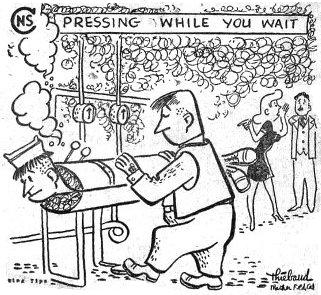
|

Four Years Old
Four years ago ATC had two officers, four enlisted men and a map of the world - and a job to do.
Today its personnel number 200,000 officers, enlisted men and civilians working around the globe.
Four years ago its first job was to deliver to Canada lend-lease aircraft for the British.
Today it spans the Atlantic every 20 minutes, the Pacific every 50 minutes; delivers combat aircraft to every fighting front; operates airlines in Europe, India-China-Burma, the Southwest Pacific; transports thousands of tons of war materials across the mighty Himalayas to China where hundreds went before; provides tactical support to front line troops in every operating theater, evacuates the wounded, injured and sick from forward areas, and circles the globe on regular schedules, in the teeth of not only the elements, but the enemy. This it does, safely, dependably and regularly - on time.
ATC's work in supporting the Allied armies, which have soundly beaten Germany and now are bringing Japan to her knees, is a lasting monument to Lt. Gen. Harold L. George, its commander almost since its start, and to every officer, enlisted man and civilian who has worked for it and flown for it. To the crew members who have given their lives, ATC's achievements are a lasting tribute.
ATC will never die. As the air power which has delivered goods of war around the world is converted into carrying goods of peace, ATC will stand tested, qualified and ready to serve the United States well in the international traffic of an air age.
To Guys Out There
Who said ATC meant Allergic To Combat?
Once before that idea was blasted when planes of the command started operating in areas which were combat zones.
Who said flying transports was a soft job?
There have been times when people might have had that notion but it should have disappeared when aircraft with the ATC insigne showed up in the North African campaign, in the invasion of Europe.
And how about the Hump?
It used to be, early in the war, that when ATC was mentioned back in the States some wise guy would pop up with a remark about "home guards" or something like that. That has been changed by those who know, even if some little fellows still might think pushing sky-trucks around the airways is a cinch.
If it hasn't been changed, a lot of fellows, good guys, have died for nothing - not that they were fighting for public recognition or to satisfy some self-centered joker at the mid-city bar. But it's nice to know the folks back home realize what you're doing.
From the publicity the Hump and its men have received, it would seem that most folks realized transport flying in ICD is a tough job. That publicity given out Stateside was no more than was deserved. A lot of swell men have pushed their last throttle, pulled their last chock and sent their last position report in getting the goods across the Rockpile.
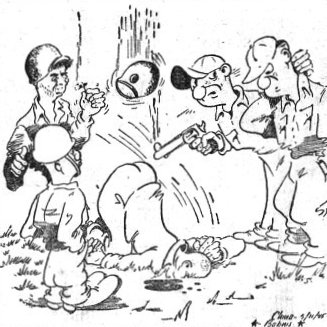 "He took TWO puffs!"
"He took TWO puffs!"
|
Even today, with all of the modern advancements and improvements in ICD, the Hump routes are no easy streets. The fellows out there right now are proving that it takes guts to fly the Hump.
ICD's work does not stop when the wheels of the planes touch China soil. It's just beginning another phase of the task - a tougher one.
Not fully realized is the extent of this division's activities in direct tactical support of combat organizations now fighting the battle of China. When the transport wallahs said they would deliver the goods, they meant they would deliver them - to the right place, at the right time.
They meant they would take the essential war items up to the front line and off-load them where they were sorely needed. And ICD is doing just that ... now.
The activities of ICD in the recent China campaign to save certain strategic areas proves that the men who fly, maintain and support the transport ships in combat zones well deserve the DFC's, Air Medals and cluster the War Department has awarded them. Bullets are the same whether they hit a transport plane of a fighter, a Dumbo or a dive-bomber. In any case they're marked with one word - death.
We don't go for flag-waving, nor do we believe in false fronts, but we do know that our guys are doing a good job.
Men of ICD have every right to be proud of their organization - every right to look any guy in the eye and say, "Bud, I was in ICD."

There is considerable speculation and uncertainty here as to the reason that there was such a large cut in personnel of flying pay status at this field this month.
During last month and in previous months the quota of flying status personnel in Squadron C had been about 38, but this month it was reduced to seven men. This represents a cut of approximately 80 percent and has cut the morale here in a like quantity.
The general conjecture is that our new CO has discovered a new directive governing this flying pay slash. I am an instrument specialist here and have been required to participate in frequent and regular flights and have previously been on flying pay.
Myself and 37 other men here would appreciate any help you might offer in clearing up this rather confusing situation.
- Pfc. David A. Deans, Sqdn. C, 1340 BU, Kunming, China
Ed.-Your CO had nothing to do with the cut in men on flying status. The whole thing came about when adjustments were made to insure a more fair and equal distribution of enlisted men on flying duty throughout the command. Seems that (pro rata) some bases had more than others.

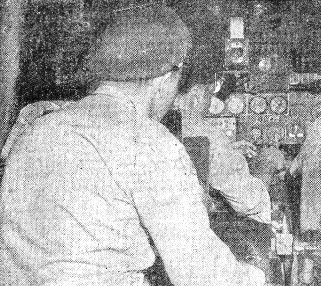
Old Air Dogs, New Tricks |
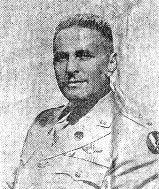
Lt. Gen. George |
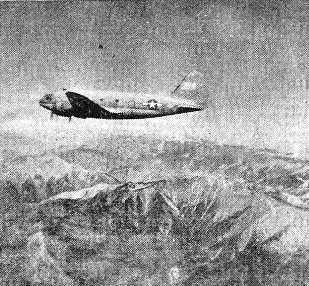
ICD Climbed a Mountain |
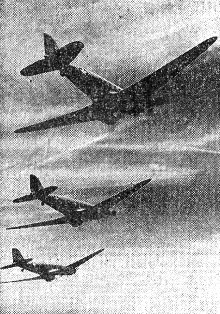
The World Grew Smaller |
Taking Great Role in War
On May 29, ATC will be four years old - four years of working for victory.
Growing from the first group of two officers, four enlisted men and a map of the world, the command now has a total strength of more than 160,000 officers and men.
I flies more than 2,000,000 miles every 24 hours, flew more than 600 million miles in 1944 - equivalent
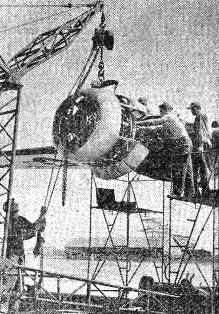
GI Sweat Keeps 'em Upstairs |
In the beginning the organization was officially designated the Ferrying Command, but as the volume of its operations increased all transport and cargo work was combined under the official designation, the Air Transport Command on July 1, 1942.
Pilot Shortage
Guided in its plans and policies by Lt. Gen. Harold L. George and his staff, ATC covers every part of the globe with the wings of its aircraft.
To establish the records of mileage and tonnage flown, the amount of ferried aircraft delivered and the low accident rate which has prevailed since its inception, the command has had to establish a foundation of training, maintenance, communications and supply.
At first the problem of obtaining sufficient pilots was serious because graduates from the Army flying schools were needed for tactical organizations. However, through the use of civilian pilots, eventually commissioned as service pilots, the shortage was overcome.
Tamed the Hump
New routes, pioneered by ATC, have become the means of unceasing delivery of cargo and planes to meet the needs of the war, and also the basis of post-war plans for world airlanes.
Flights which were termed impossible, stops at almost inaccessible parts of the globe, are now considered routine.
One of the most spectacular achievements has been the subjugation of the Hump by the ATC's India-China Division - a thrilling tale of men, machines and management.
As the world watches the increased efforts and accomplishments of the Air Transport Command it is apparent that it has just begun its flight. The world will remember these deeds - After Tomorrow Comes.
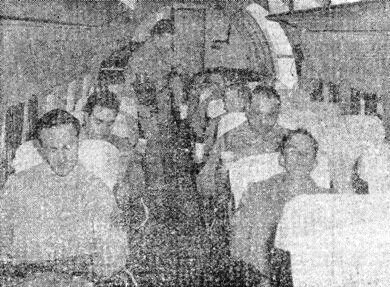
The Best of Quality Service |
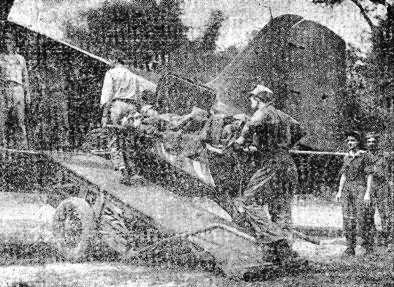
Many Lives Were Saved |
Hindu Religion is All-Embracing, Has Place for Sinner, Saint;
Accepts All Creeds, Says Prof
Sect Has Never Undertaken Missions or Crusades Nor Established Any Inquisitions In Its 5,000-year History
(Editor's Note: The views expressed in this article are those of the writer and do not necessarily reflect the opinion of the ICD or the Hump Express.)
By Prof. B. J. Vaswani
I once had a friend in the American Army. He was a devout Christian, a Catholic. He was a noble specimen of humanity. He loved to converse with Indian friends and would often say, "You folks are so very intelligent, so joyous, so good; but it's a pity you are not Christians."
He evidently believed there is only one way to salvation, and that, through Christianity, and that other religions lead men to perdition. He was sorry that we were bound for Hell.
An old missionary who admired a Swami and felt inspired by his discourses on Yoga and Gita, continually begged him to embrace Christianity, for how else could he ever go to Heaven? This attitude of devout Christians, to the Hindu mind, is a negation of true religion.
Allows Other Religions
Hinduism, particularly in its highest form,
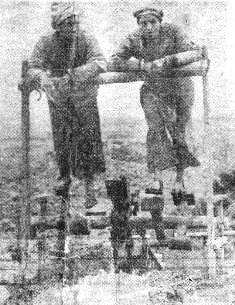 These boys are not getting in shape for the coming football season, although the gadget they are working on resembles
something a football coach dreams up. Instead this is a two-man drainage system in operation, drawing the water from
a ditch and allowing it to run off the side of this field in China.
These boys are not getting in shape for the coming football season, although the gadget they are working on resembles
something a football coach dreams up. Instead this is a two-man drainage system in operation, drawing the water from
a ditch and allowing it to run off the side of this field in China.
|
One essential difference between Hinduism and Christianity or Islam or Judaism is that Hinduism is as all-embracing as universal life, all-inclusive. It has never started missions to convert the peoples of the earth to its faith, never established inquisitions or undertaken crusades in its long history of 5,000 years. It has ever allowed religions to obtain footholds on the soil of India and give them freedom to flourish.
There has never arisen in India any occasion for the burning of heretics or the persecution of scientists, as was the case in Europe for several centuries. Hindu religion has a place for the sinner as well as the saint, an appropriate way of approach for humans who are too underdeveloped to think of God in the abstract and must think of him in the form of pictures (images).
It has the sublimest philosophies for those whose lives are lived on the higher planes of intellect. It provides scope for the scientist as well as for the men of faith. It offers a way of realization for the man of action as well as for a mystic. It can tolerate even an agnostic. It is true to life: it is true to nature.
On account of its myriad forms, on account of its countless approaches to truth, its many gods and goddesses, it is often misunderstood by those who see only one aspect of it, and ignore the totality which is Hinduism.
Fellowship of Faiths
Many know of the story of the elephant and four blind men. Each desired to know what an elephant was like. One touched the leg of the beast and concluded the elephant was a pillar. Another happened to touch the ear and said it was like a fan and so on. That is what a superficial observer of Hinduism thinks of Hinduism.
No wonder some people condemn it as image worship, some as polytheism and so on. But it is all that and more, because it is as large as life. That explains why Hinduism, unlike other religions, believes not in one prophet and one sacred book but many and incorporates within itself all the stages in human evolution.
'Don't Give Me Da Buddy Stuff, Corbin, Ya Bum'
Longtime Friends Fool Bases With Baloney About Family Tree
1337 BU, Sookerating, Assam, India - "Naw, that guy isn't my brother. He's climbing the social ladder." That's the comment any question about the relationship of F/Os Marion H. Ewing and Corbin V. Ewing elicits from Corbin.
Marion H. enjoys confusing people and sometimes casually mentions a "brother" here. Corbin V. always disclaims any association, other than business, with Marion.
The two pilots have known each other since 1936, when Corbin abandoned his native Nebraska and moved to Los Angeles, a town Marion claims to be a suburb of his home town Ventura. They started flying together as civilian pilots and earned instructor's licenses.
In their extra-curricular activities they met two young ladies who owned an airplane, and subsequent marriage of the boys Ewing to the girls was not a fiscal matter.
Time did what was expected, and the Ewings found themselves in the Army and eventually flying as pilot and co-pilot is Assam.
The Ewings have pulled the brother routine on nearly every unit on the base. Even the colonel was taken in at first.
PX Mobile Canteen Serves Men on Line
1327 BU, Tezpur, Assam, India - The Army exchange at this base has initiated a new service by establishing a mobile canteen to serve men on the line during afternoons.
Cold drinks, candy, peanuts and cookies are dispensed through the new system. This move has met with the approval of all men who work out under the broiling sun. Formerly they were unable to get to the PX and the snack bar during duty hours.
Lost Airplanes Use Mayday Call To Ask For Help
D/F Specialists Bring 'em Back When Ships Are Gone Astray
1350 BU, Kunming, China - In ordinary operations from Kunming, calls from ATC ships in the sky come over the AACS's radios as a routine procedure. Pilots call for landing instructions and await their turn to land.
Then suddenly from one speaker comes a frantic voice. "Mayday, mayday" it calls. The radio channel goes quiet. Somewhere over the Hump a plane is lost.
In a special department instituted solely to guide lost planes to a safe landing, an ATC pilot goes to work. Maj. W. R. Franscione, who for 18 months flew the Hump and intra-China routes, heads these selected pilots. He flips a switch and asks the lost pilot where he started from, his altitude, his fuel supply and many other pertinent questions.
Sent Astray by Storms
With a large map of the area before them, the AACS boys got to work and plot the bearing from each base to the lost plane. The aircraft is located at the point where the bearings from the many direction finder stations converge. The Kunming finder station notifies airways control which in turn notifies the pilot as to what heading he must fly to get to the closest airfield. Thus another lost plane is led home.
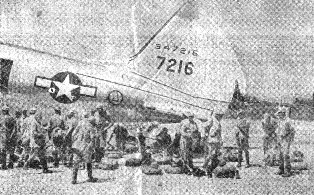 Part of the Sixth Chinese Army, which ICD helped to fly from Burma over the Hump.
Part of the Sixth Chinese Army, which ICD helped to fly from Burma over the Hump.
|
Winds and electrical storms send pilots far astray. Once a transport bound for Kunming from India turned up over Formosa - 600 miles off course as the result of a 160 mph tail wind that almost double the plane's speed. It took nearly 15 hours to bring in the plane - during which the crew chief pumped fuel from the cargo into the plane's tanks.
When heavy storms break suddenly, catching 50 or more planes over the Hump, mayday, which is French (M'aidez) meaning "help me," is a dramatic madhouse, a fight for life or death.
Shoot Bearings
A pilot, flying on instruments, whose radio compass goes out has no way of knowing where he is. Often in bad weather the radio compass needle will point to a thunderstorm instead of the homing beacon. When fuel begins to run low, the radio operator contacts any one of the AACS direction finder stations in the Hump area.
The station notified contacts the other stations and they all shoot a radio bearing on the lost plane. Thus, in bad weather the radio hum with radio operators distressed voices, and the men working the maps feverishly manipulate strings to find the exact location of each plane.
Some of the fliers are cocky. Some are as calm as a man can be only when beating down fear of death. Once in a while a man cracks and the radio becomes silent for a while until the operator again can speak.
The plane's radio must be kept busy so the stations can get a bearing on it. One pilot recited the Gettysburg Address. Another read the latest letter from his wife. Then there was "The Singer." Mayday will never forget him. He sang, and his song was "Show Me The Way To Go Home."
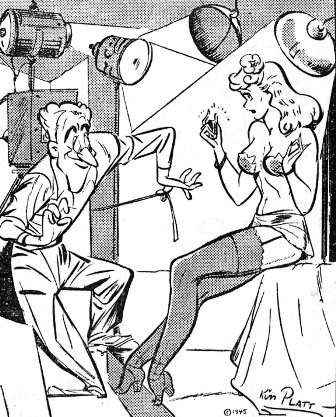 "That's it, Miss Flotsam - the public has to think it gets you with the candy bar . . ."
"That's it, Miss Flotsam - the public has to think it gets you with the candy bar . . ."
|
Sad Tale of Major's Woe
- In Bed You Never Know
1302 BU, Delhi, India - A certain major one day heard a noise of wings that wasn't a bird. Investigating round his bed, he found a bee, and knocked it dead.
Thinking some wayward dab of sweet had lodged itself within a sheet, he bade his bearer fling away the sheets and bring some fresh that day.
Untroubled were the next night's slumbers. Next day the bees were there in numbers - nor were they difficult to trace. The sack, for certain, was their base.
The mattress must be where they hide, he thought, and ordered it outside. That night he slept upon his new and virgin mat the whole night through.
At dawn the sorry cell was black with zooming bees, defying flak, prepared on major-hide to sup, while dozens more sat revving up.
"Bearer, today this ends," he quoth. "Either you go, the bees or both."
The ultimatum upped the jig - it made the nearer really dig. Within the webbed tape of the sack itself the bees had built their shack.
The scraper scraped, the filit-gun roared, and from the major's bed and board the bees departed. Now he sleeps more soundly, and without the creeps. His only worry since has been -
Had he been sleeping with a queen?
HUMP EXPRESS is the official newspaper of the India-China Division, Air Transport Command, APO 192, c/o Postmaster, New York, N.Y., and is published by its Public Relations office. Camp Newspaper Service and Army Newspaper Service features are used, reproduction of which is prohibited without permission of CNS and ANS, 205 East 42nd St., New York, 17, N.Y. Other material is submitted by staff members, ICD-ATC base Public Relations sections and other soldier correspondents. Printed weekly by the Hindusthan Standard, 3 Burman St., Calcutta, India, and distributed each Thursday. Passed by U.S. Press Censor for mailing.
| Military transport schedules over India for cargo, personnel and mail . . . maximum tonnage of essential war materials over the Hump . . . movement of troops and supplies in support of tactical operations in China . . . evacuation of the sick and wounded - these are the missions of ICD-ATC. |

MAY 24, 1945
Original issue of HUMP EXPRESS shared by CBI veteran Steven C. King, author of Flying the Hump to China.
|
A similar, better quality image of Jimmy Doolittle was used in this recreation. |
Copyright © 2006 Carl Warren Weidenburner
TOP OF PAGE PRINT THIS PAGE ABOUT THIS PAGE E-MAIL YOUR COMMENTS
PREVIOUS ISSUE HUMP EXPRESS BASE NEXT ISSUE
